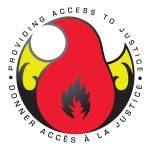By Jeff Plain
As an indigenous Aboriginal person myself, I understand that feelings of apprehension and hopelessness can arise in seeking and accessing justice. These feelings can stem from distrust in justice systems —whether criminal, family, civil or administrative.
Meeting an important need
We have already witnessed tragic outcomes of incarceration and suicide that our families and communities face. And as many Aboriginal persons—increasingly Aboriginal youth—move into urban areas, navigating life can be a challenge and difficult when laws and legislations are foreign to them.
Appropriate assistance through agencies that understand the “Aboriginal experience” is needed so people do not continue to fall into the cycle of homelessness and poverty, and might be more apt to access or seek justice. Understanding culture, dialogue, Aboriginal identity, and spirituality along with being non-judgmental and relatable is essential to engage clients.
These beliefs, along with the reality of other barriers such as the difficulty of travel for on-reserve individuals, were the basis for my involvement with Community Legal Assistance Sarnia (CLAS) in the development of the Baamsedaa “Let’s Walk Together” program.
How does the program work?
The Baamsedaa program provides appropriate support throughout clients’ involvement with CLAS. We really focus on ensuring communication lines are open. This allows us to have conversations with clients that can result in the identification of many issues, or provide appropriate referrals to other agencies.
While the program itself was developed and operated by CLAS with the support of Legal Aid Ontario funding, our partners include many of the vital social services in Sarnia-Lambton. Their involvement makes it easier for clients of all agencies to receive appropriate help for issues that they face.
Since its inception in 2011, Baamsedaa has been used by the Sarnia-Lambton courts, Lambton College, Children’s Aid Society, private bar lawyers, out-of-area agencies and organizations seeking referrals or assistance for their clients. Because the Aboriginal community readily supports work that benefits the Aboriginal peoples, potential growth of the program is available and possible. Indication of this was the opportunity to advise, assist and collaborate with the Hamilton Community Legal Clinic as it developed its own Baamsedaa-modeled Aboriginal outreach worker position, currently held by Lyndon George.
What I am most proud of as an Anishinabe
As an Anishinabe, what I am most proud of personally is having the ability to help others and to educate. My experience enables me to genuinely relate while working with clients to lessen their apprehensions, distrust and fears—to the extent that I have seen attitudes altered, which can result in a new direction for people, their family and even ultimately a community.
I am also proud of the recognition Baamsedaa/CLAS has received from both the Aboriginal and non-Aboriginal community. Aboriginal elders presented us with an Eagle feather in recognition of work with Aboriginal youth in 2012, and the Ontario Municipal Social Services Association gave us the provincial “Local Municipal Champion” award in 2013. Recognition such as this is indicative of cross-cultural education, which results in a better understanding of the Aboriginal experience, and the justice system.
The impact of Baamsedaa
I have seen clients who have been able to address their issues perceive a sense of fairness. Those who sought redress understand the legislative processes more fully, and that there can be mechanisms in place that want to and will listen to clients while making decisions.
Hopefully, the more who participate in the processes, the more understanding of each others’ systems, beliefs, and cultures will occur. It takes courage and strength to seek and access justice in a foreign system, but doing so will empower people and create moments that can positively alter circumstances.
It will take time for the work that I provide, and along with the work of other agencies addressing Aboriginal justice issues, to regain our clients’ trust and confidence in the systems. But Legal Aid Ontario’s commitment to its valuable Aboriginal Justice Strategy, and its continued funding of Baamsedaa-type services, will help us alter the attitudes of people in the justice systems and enhance inclusion.
Jeff Plain is a community legal worker at Community Legal Assistance Sarnia (CLAS). He and CLAS developed and run the Baamsedaa program for this community legal clinic.
LAO is pleased to announce that Community Legal Assistance Sarnia’s Baamsedaa program is being funded for another two years as of the fiscal year 2014/15.
 Aboriginal Justice Strategy
Aboriginal Justice Strategy